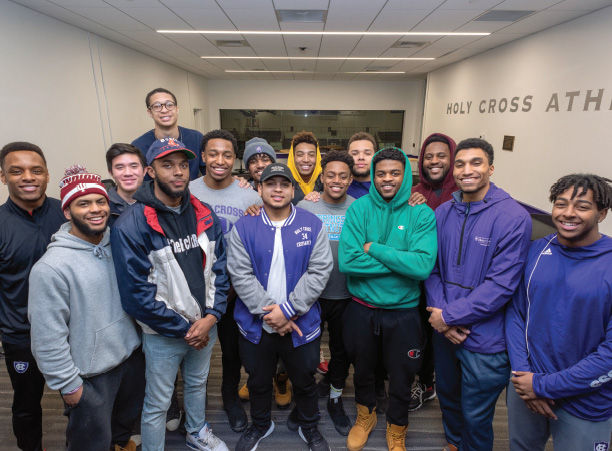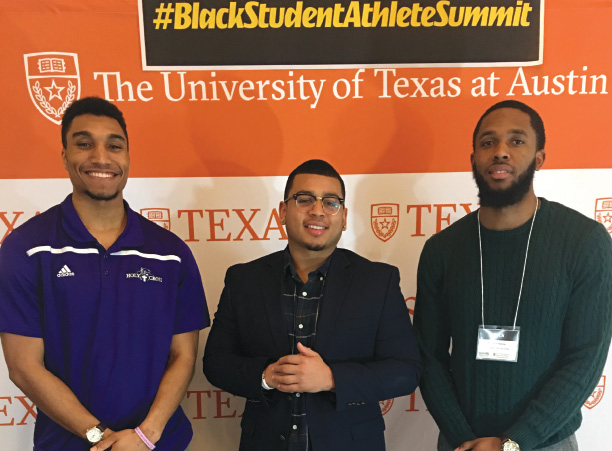 Former NFL quarterback Colin Kaepernick spent the 2017 and 2018 football seasons out of work. And even if he never takes another snap, he leaves quite a legacy.
Former NFL quarterback Colin Kaepernick spent the 2017 and 2018 football seasons out of work. And even if he never takes another snap, he leaves quite a legacy.
Kaepernick's influence was on display at January's Black Student-Athlete Summit (BSAS) in Austin, Texas, where Marcellis Perkins '19, a sociology major and member of the men's basketball team, presented a paper, "Because He Is Seen but Not Heard: How Creating Spaces for Black Male Athletes Contributes to Holistic Development." Perkins' presentation won raves, making him an "instant rock star," according to fellow Holy Cross student-athlete and BSAS attendee Martin Dorsey '19.
Perkins' presentation was inspired by Men of Color Athletes (MOCA), a student group he helped found three years ago with Dorsey, a wide receiver, and Andre Chevalier '19, a linebacker and the third Holy Cross student-athlete to attend BSAS. MOCA, in turn, was partly inspired by Kaepernick, whose activism in 2016 sparked nationwide debate and had a powerful influence on athletes of color.
A Shared Experience
MOCA was launched to give Holy Cross student-athletes of color a safe space in which to discuss a range of issues, from the national (Kaepernick's outspokenness, followed by what many argue has been an unofficial league ban, keeping him unsigned) to the local (challenges faced by students of color at a predominantly white college) to the personal (topics such as dating, a subject that arises at meetings, Chevalier says).
The trio of co-founders are quick to give credit to fellow pioneers Armani Dawkins, former associate director of athletics for student-athlete development, and Steven Martinez '16, former Crusaders defensive back.
The MOCA co-founders frequently cite empathy when explaining the need for the organization. "I love it here," Dorsey says, but "we might be scared to speak our minds in classes, in a primarily white institution. We feel a little more comfortable at our Sunday night meetings. A lot of times, freshmen want to talk about the experience of being the only black face in a class. We tell them, yes, there are challenges, but it's also an opportunity to offer insight and education to others."
The meetings take place every other week in the Hart Center at the Luth Athletic Complex or the Hogan Campus Center, and they're popular — a typical session may include 20 or more student-athletes of color, as well as administrators and professors. In contemporary America, where the line between sports, entertainment and politics is blurry, there's never a shortage of topics.
"We're talking about whatever's relevant that day," Perkins says. "There's a really wide range of topics. It's also important to get the viewpoints of other teammates and coaches who may not agree with you."
 Andre Chevalier '19, Martin Dorsey '19 and Marcellis Perkins '19, co-founders of the group MOCA. Photo courtesy of MOCA
Andre Chevalier '19, Martin Dorsey '19 and Marcellis Perkins '19, co-founders of the group MOCA. Photo courtesy of MOCA"We'd never been in a room with that many black, educated student-athletes," Chevalier says. "Afterwards, we learned that [Ohio State University] and others were kind of doing the same thing, which made us feel like we're trending in the right direction." Perkins notes that since the presentation, other universities have contacted him to learn more.
Mentoring and Expansion
With MOCA solidly established and nationally recognized, the group's leaders feel a responsibility to reach out to the College community. In 2018, the organization held a come-one-come-all roundtable at which student-athletes discussed the group and their points of view; one member videotaped a session and shared it with his sociology class. According to Aaron Dashiell, MOCA adviser and assistant director of athletics for student-athlete development, the group has plenty of other ideas in the pipeline, including an invitation to women student-athletes of color for a joint session.
Seniors Chevalier, Dorsey and Perkins all note that helping underclassmen adjust to college life is one of MOCA's major benefits. First-year student-athletes of color "have mostly been to [high] schools that more resembled their population," Chevalier says. "We definitely help them deal with that. There's also the everyday grind all student-athletes get used to — the time commitment. And when racial things happen around campus, we give them someone to talk to."
As the men prepare to graduate, they are especially mindful of their mentoring responsibilities. "We remember what was passed on [to us]" by Martinez and others, Perkins says. "Now it's our turn." He and Dashiell add that while specific underclassmen have not been officially named as future MOCA leaders, several are organically moving in that direction. That's especially gratifying, Dashiell notes, "as we make sure this is sustainable." In fact, he's pushing to send juniors, rather than seniors, to future summits because "it would be nice to see that energy and mindset harnessed for a full year at Holy Cross."
MOCA is eager to "reach out and get involved with the campus as a whole," Dorsey says. "We have a lot to offer the Holy Cross community."
Written by Steve Ulfelder for the Spring 2019 issue of Hole Cross Magazine.
About Holy Cross Magazine
Holy Cross Magazine (HCM) is the quarterly alumni publication of the College of the Holy Cross. The award-winning publication is mailed to alumni and friends of the College and includes intriguing profiles, make-you-think features, alumni news, exclusive photos and more. Visit magazine.holycross.edu/about to contact HCM, submit alumni class notes, milestones, or letters to the editor.

